Different Types of Medical Waste and How to Dispose Them
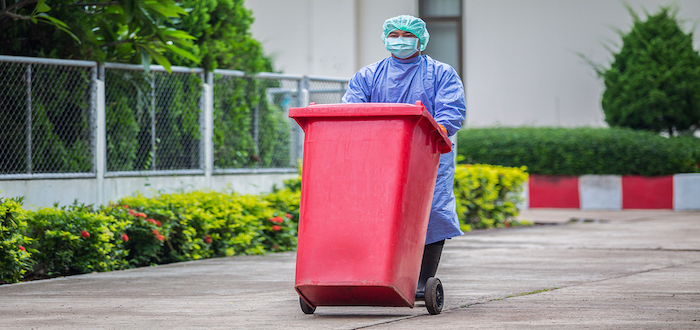
Generally defined by the EPA as any type of waste contaminated by blood, body fluids, or other potentially infectious materials (OPIM), the different types of medical waste are separated into four categories—infectious, hazardous, radioactive, and general waste.
There are countless types of medical waste in healthcare, many of which are required to be collected, treated, and disposed of differently, making it essential that as a healthcare provider and medical waste generator, you understand the different types and how to handle them.
What Is Medical Waste According to the EPA
The Environmental Protection Agency (EPA) defines medical waste as any healthcare waste that might be contaminated by blood, body fluids, or other potentially infectious materials.
With that being a very general definition though, the EPA takes further steps in its medical waste guidelines to define and categorize medical waste into four separate groups: infectious, hazardous, radioactive, and general medical waste.
Infectious Waste
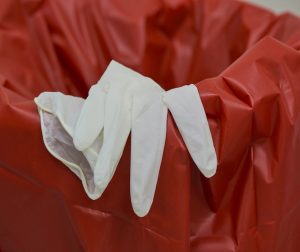 Infectious waste is any type of waste that poses a risk of infection to humans or animals. Although infectious waste comes in many forms, some of the most common include:
Infectious waste is any type of waste that poses a risk of infection to humans or animals. Although infectious waste comes in many forms, some of the most common include:
- Blood, blood products, and bodily fluids
- Blood-soaked bandages
- Human/animal body parts and tissue
- Blood cultures
- Swabs used to inoculate cultures
- Stocks
- Surgical waste (discarded gloves, etc.)
Hazardous Waste
Hazardous waste is a non-infectious waste but still has the potential to affect humans. To be considered hazardous the waste must also meet the federal guidelines from the Resource Conservation and Recovery Act (RCRA) for what is and isn’t hazardous waste. Common types of hazardous waste include:
- Chemicals (medical and industrial)
- Chemotherapy agents
- Hazardous medications
- Sharps
Sharps
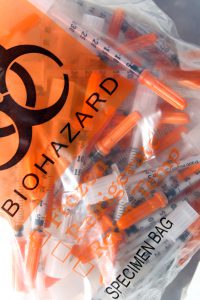 Although technically they fall into the hazardous waste category, sharps are often treated as a separate waste type because they need to be collected and disposed of separately from other medical wastes. Common sharps types include:
Although technically they fall into the hazardous waste category, sharps are often treated as a separate waste type because they need to be collected and disposed of separately from other medical wastes. Common sharps types include:
- Needles
- Syringes
- Lancets
- Scalpels
- Razors
- Ampules
- Broken glass
Radioactive Waste
As the name implies, radioactive waste is any waste containing radioactive materials. Besides just waste generated from nuclear medicine treatments though, other common radioactive waste generators and types include:
- Cancer Therapies
- Brachytherapy treatments
- Radiotherapy liquid
- Lab research liquids
- Medical equipment using radioactive isotopes
- Contaminated glassware and supplies
- Fluorine-18 (F-18)
- Technetium-99 (T-99m)
- Iodine-131 (I-131)
- Strontium-89 (Sr-89)
- Iridium-192 (Ir-192)
- Cobalt-60 (Co-60)
General Waste
 General medical waste is similar to other non-hazardous office or household wastes and makes up the majority of waste produced in healthcare.
General medical waste is similar to other non-hazardous office or household wastes and makes up the majority of waste produced in healthcare.
Although it’s not always the first thing to come to mind with medical waste, the patient’s PHI, and medical records disposed with other general medical waste is tightly regulated by HIPAA, making it important to also take steps like working with a shredding provider to help dispose of medical paperwork safely.
How to Dispose of the Different Medical Waste Types
There are multiple methods like incineration for disposing waste, but because the various types of medical waste all have different treatment requirements it’s important to start the disposal process by separating medical waste first.
Separating Medical Waste Types
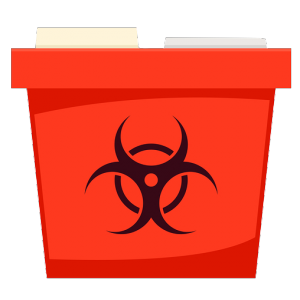 Infectious Waste
Infectious Waste
Red Containers and Bags
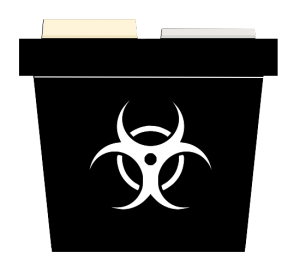 Hazardous Waste
Hazardous Waste
Black Containers
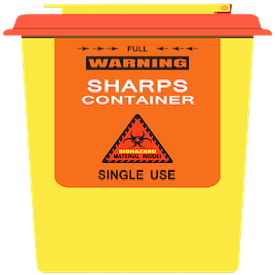 Sharps Waste
Sharps Waste
Puncture-Resistant Containers with Biohazard Symbols
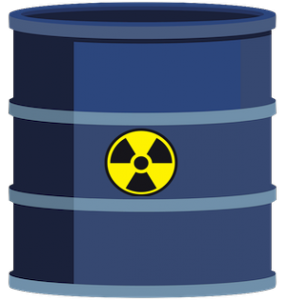 Radioactive Waste
Radioactive Waste
Shielded Containers with Radioactive Symbol
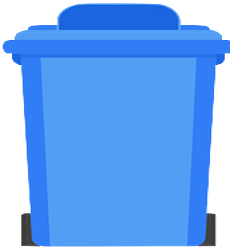 General Municipal Waste
General Municipal Waste
Shredding and Trash Bins
Medical Waste Treatment and Disposal Methods
- Incineration – Typically used for pathological and pharmaceutical waste—never for plastics
- Autoclaving – Typically used for infectious waste, sharps, and other hazardous wastes
- Microwaving – Alternative to autoclaving for treating infectious waste, sharps, and other hazardous wastes
- Chemical – Typically used for chemical and liquid waste (i.e. laboratory cleaning waste)
- Biological – Experimental and rarely-used method for treating hazardous and infectious organisms
Are You Handling and Disposing Your Medical Waste Safely?
Join countless organizations in the healthcare industry who we’ve helped to learn more about the medical waste they’re producing and how to safely dispose of it. Medical Waste Pros can provide all the medical waste disposal services and information you need.
For free quotes on medical waste disposal services, simply fill out the form or just give us a call at 888-755-6370 today.










